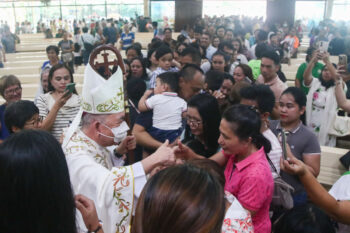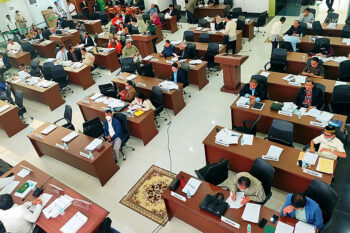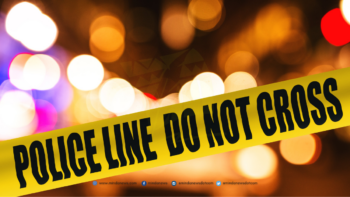Understanding that any program or policy that would require action to prevent and counter violent extremism (PCVE) would require policy and legislative formulation.
In order to effectively implement programs and interventions to prevent and counter violent extremism, policy and legislative intervention are crucial and vital to ensure that these interventions could be more institutional, more effective and there is a sense of ownership not only among civil societies and government agencies, but a lasting policy that can be said to be etched in stone that can be used as a continuous and sustainable approach to PCVE.
Its institutionalization can be made possible through legislative and policy instruments executive by legislative and executive bodies. The aim of this article is to explore mechanisms where this institutionalization can possibly happen.
Peace and order councils.
Peace and order councils (POC’s) in the Philippines are inter-agency councils wherein both government agencies and civil society organizations represented can present a working collaboration on both inter-agency and intra-agency levels. Peace and order councils in the Philippines are of two types, (a) the national and the (b) local peace and order councils. The national peace and order council has two levels, the National Peace and Order Council which is basically an interagency council chaired by the Secretary of the Interior and Local Government (SILG) and the subnational which is the cluster (Luzon, Visayas Mindanao) and the Regional Peace and Order Councils (RPOC).
The NPOC functions to contribute to the strategies of the National Security Council that would effectively respond to peace and order problems, through implementation, coordination and monitoring peace and order plans, it also functions to provide a forum for inter-disciplinary dialogue and deliberation of major issues and problems affecting peace and order[i]; local peace and order councils also called subnational councils[ii].
These subnational POC’s such as RPOCs, PPOCs (provincial), CPOCs and MPOCs (city and municipal) and BPOCs (barangay) function as a forum for dialogue and deliberation of major issues and problems affecting peace and order, including insurgency; propose measures which will improve or enhance peace and order and public safety in their respective areas of responsibility, including anti-insurgency measures; propose measures to converge and orchestrate internal security operations efforts of civil authorities and agencies, military and police; as well as Perform all other functions assigned by law, the President or the NPOC[iii].
And considering that the POC’s represent the current whole of nation approach as it incorporates on a national, regional, provincial, city/municipal and barangay inter and intra-agency cooperation, it can generate policies through the passage of POC resolutions wherein agencies can agree to work together on specific policies and programs on PCVE and which the operative mechanism of these resolutions on an agency or institutional level can either be manifested through the:
- Passage of legislation on the local government level sanggunian
- Issuance of departmental or executive orders or memoranda highlighting the operational roles of the institution or agency in the PCVE program
Part of the examples developed and implemented on an operative level at the Peace and Order councils by the undersigned together with other technical experts were:
- Endorsement of Muslim Consultative Councils and Muslim Affairs offices as a mechanism for empowerment and to counter VE infiltration in communities in the National Capital Region (NCR) which was endorsed by then NCR RPOC Chair Mayor Herbert Bautista who was RPOC chair and QC mayor and was also implementing an enhanced Muslim Consultative Council which was started by then Mayor Sonny Belmonte and enhanced by Mayor Bautista during his term.
- Development of a community anti-terrorism response plan that was developed and implemented at the City of Muntinlupa under Mayor Fresnedi. This involved both empowerment of the Muslim Affairs office playing a bigger role together with law enforcement agencies in developing a community watch that is more developmental and community centric focusing more on citizen participation and cooperation. This model was passed by the Muntinlupa as MPOC resolution.
- Development of a more robust community response plan against terrorism which was then endorsed by the Marikina POC as a policy spearheaded by Mayor Marci which was then adopted by the city government and barangay LGUs of Marikina.
- Development of a more robust peace and security plan for the Cordillera POC and the Baguio POC which was spearheaded by Mayor Morris Domogan which highlighted a more empowered collaboration between civil society organizations (CSOs) of Cordillera and Baguio City in partnership with the different regional offices of government in the Cordillera
- The Region 2 RPOC and and the Cauayan City POC response plan to the planned Juhur Ijtima of the Tabligh which resulted to a more secure and peaceful implementation of the Juhur Ijtima which was rescheduled after the ASEAN summit.
Legislation as an institutional mechanism for PCVE sustainability.
Local government units (LGUs) have legislative bodies called Sanggunian (councils/boards) which essentially perform the function of creation of laws and policies that govern operation of programs and projects at the LGU level. These can be differentiated into the following:
- Provincial Boards (Sanguniang Panlalawigan)
- City and Municipal councils (Sanguniangs Panglungsod/Bayan)
- Barangay Council (Sanguniang Barangay)
These local legislative bodies can create policies that can empower PCVE programs and projects such as enabling financial support and provision through allocation of line budget for special projects like an annual youth leadership summit, training for cultural sensitivity for uniformed law enforcement officers, local Madrassah/IP education Board, community based security plan and other projects/programs that would support PCVE. The only delimitation of these local councils is that they are done within the context of the territorial demarcation of the LGUs.
National legislation is of course the highest form of legislation that can done, wherein current existing legislation such as the Human security act can either be amended, or new legislation can be crafted on a national level that will empower all agencies to conduct PCVE programs.
Executive and administrative issuances.
The President, in his capacity as the Chief Executive of the Philippines, whether in the exercise of the executive power or broader powers conferred by emergency or at particular periods can issue executive and administrative issuances. They may be in the form of (1) Administrative Orders, (2) Implementing Rules and Regulations of Administrative Orders, (3) Executive Office (laws and issuances), (4) Administrative Decisions,(5) Executive Orders, (6) Memorandum Circulars and Orders and other special directives that may be issued by the president[iv]. He can also create and move offices being the Chief executive[v]. The current National Action Plan on PCVE is one of the clear examples which is being formulated under the auspices of the National Security Council and both government, non-government and civil society partners, after which will be signed into a draft executive order.
Department secretaries as alter-egos of the President can also issue Department Orders that may serve as policy and administrative frameworks for PCVE program and project delivery, subject of course to existing rules and regulations.
Integration protocols as a way ahead
In order to have better integrated PCVE programs and policies at the regional, provincial and local levels, the suggested policy can be in the following process:
For local integration, Local peace and order councils can propose policies and programs that are needed in a particular area such as the Youth Leadership Summit and Local community watch system.
These programs then can be endorsed to local legislative councils for support through institutionalization wherein ordinances can be passed and both logistical and operational support could be provided by local government. Unlike the intelligence fund provisions from the Mayor or governor, which can be cut or realigned for other purposes, programs that are institutionalized through the passage of Sanguniang ordinances and resolutions become institutionalized and whose operations can be appropriated from the LGU budget for every fiscal year.
For national level PCVE interventions, the President may issue an executive order mandating implementation of PCVE programs or may direct specific agencies to implement these programs. Cabinet secretaries then may issue directives that are in line with the Presidents instructions. These can be institutionalized when they are legislated into law by Congress like the Terrorism Financing Act or the programs like Trainings on PCVE be included in the general appropriations act (GAA) which is passed annually by both houses.
(MindaViews is the opinion secdtion of MindaNews. PeaceTalk is open to anyone who wishes to share his/ her thoughts on peace in Midnanao. Yusuf Roque Morales is a Commissioner at the National Commission on Muslim Filipinos. Morales worked together with then OIC of the DILG USEC Catalino Cuy (now chair of the Dangerous Drugs Board DDB) in engaging and capacitating the different Peace and Order Councils in addressing the threat of violent extremism from 2016-2017.The author is both a member of the academe and a government official addressing concerns of Muslim in the Philippines, he has written several articles, monographs and researches on Muslims in the Philippines and has been one of the leading subject matter experts on prevention and countering violent extremism in the Philippines).







